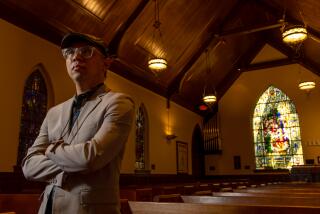Risking Christianity in China
- Share via
In 23 years of visiting underground Christian churches in China, Pastor Jonathan Chao has seen his friends interrogated, detained and imprisoned.
“It’s a little frightening,” said Chao, who lives in Covina but visits China several times each year. “I never know what may happen. I pray and ask for God’s protection.”
The 63-year-old Chinese American has avoided arrest, but knows the dangers every time he travels to villages and clandestinely trains church leaders.
Through evangelism and education, Chao and others like him try to promote Christianity in a country that has repressed religion since the Communist takeover of 1949, when the government blamed Christian missionaries for aiding Western imperialism in China.
“Our aim is not to overthrow communism per se,” he said. “But the spread of the Gospel will bring about change. It’s slowly eroding the government.”
China guarantees religious freedom in its constitution, but approves just five official religions, which the government controls through registration and selection of leaders. Some religious groups, including underground Christians and Falun Gong followers, often are persecuted.
The government intensified attacks on those groups last year by arresting and torturing followers and destroying religious buildings, according to a report this spring by the U.S. Commission on International Religious Freedom.
The Beijing government has labeled Falun Gong a cult and a threat to the state and says religious persecution does not exist in China.
Bob Fu says otherwise. A Chinese native who converted to Christianity in college, Fu met Chao at a secret training session for pastors. The visiting American pastor inspired Fu to start his own underground church. But Fu was teaching English at a Communist Party school at the time and knew it was dangerous.
Little Money but Lots of Heart
Fu’s church met in restaurants, homes and parks in a suburb of Beijing. When he nearly lost his will to keep preaching, he thought of Chao and his devotion to Christianity.
“He doesn’t have much money to provide, but he does have heart,” Fu said. “He has sacrificed for the whole Chinese church movement. There is nobody that is doing Chinese ministries who compares to him.”
In 1997, the authorities caught up with Fu and imprisoned him and his wife. After they were released from prison and placed under house arrest, the couple fled to Hong Kong, and then America. Now Fu attends the same seminary in Pennsylvania where Chao studied.
Chao said he feels a duty to publicize the persecution of followers. “Just for preaching the Gospel, they should not be labeled as cults,” said Chao, who punctuates his stories with passages from the Bible. “ ‘He that believeth in me, the works that I do shall he do also,’ ” he said, quoting the Gospel of John.
In 1978, Chao founded the Taiwan-based research institute China Ministries International, which also has an office in Pasadena. The nonprofit center researches Christianity in China and provides support for underground churches throughout the country.
His work has been praised by religious leaders and human rights activists. But his method of spreading the Christian faith has drawn criticism.
Protestants who belong to the state-approved church say Chao should work with Chinese authorities and within the official church, said Richard Madsen, a UC San Diego sociology professor who has researched religion in China.
“In the long run, it might be better for the growth of the church if foreigners treaded more carefully,” Madsen said. “Otherwise, the church in China could be seen as being propelled by foreign forces and could lead to more prejudice.”
Though Chao was born in China, he has lived in the United States since 1958.
One of 10 children of a Presbyterian minister, Chao attended the Westminster Theological Seminary and then received a doctorate in Chinese studies from the University of Pennsylvania.
He took his first trip to his native country in 1978 with a tour group to interview house church leaders about the history of Christianity in China. A few years later, he began preaching and organizing.
Since then, Chao, who has wavy hair and wears thick glasses, has visited the country more than 100 times, officially traveling as a tourist. While there, he usually stays with friends so the government cannot use him to find the house churches.
In addition to preaching and training young pastors, Chao publishes journals about Christianity in China, maintains a Web site and raises funds for the churches.
He relies on donations for the institute, which runs on an annual budget of $200,000 and has more than 40 staff members.
Chao’s wife of 36 years, Rebecca, often accompanies her husband on his trips. “We just feel God called us to do this work in China,” she said. “Since he is with us, we are not afraid.”
Goals Religious, Not Political
Ken H. Wong, pastor of First Evangelical Church of the San Gabriel Valley, traveled to China with Chao’s group last spring and said Chao is having an impact on the growth of Christianity in China.
“Because many of the young leaders are unskilled and have very little education, he plays a key role in making sure they have a clear understanding of [Christian] doctrine,” Wong said.
He believes Chao has not been arrested because the Chinese government recognizes that his goals are religious, not political.
Chao encourages foreign and Chinese American pastors to join him on his mission trips, but warns them of the risks.
“I guarantee I can take you into China, but I can’t guarantee I will get you out safely,” he said.
“I cannot even protect myself.”
So he relies on God. When in China he gathers with worshipers in converted apartments and houses.
With Chao at their side, they bow their heads, hold hands and sing:
“Be merciful to the church in China. Listen to the cry from afar.”
More to Read
Sign up for Essential California
The most important California stories and recommendations in your inbox every morning.
You may occasionally receive promotional content from the Los Angeles Times.













